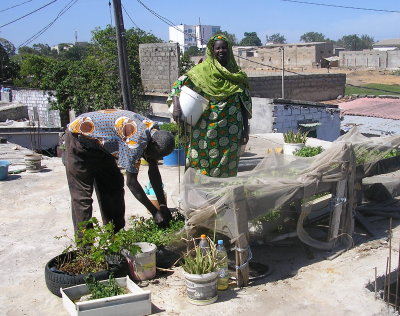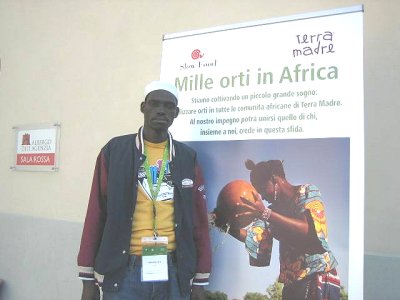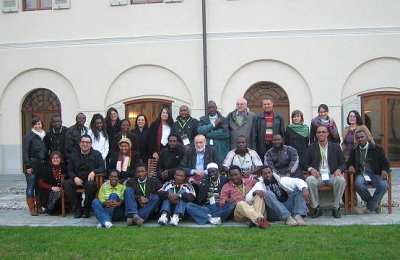One of the three Mundus maris delegates to the 4th edition of Terra Madre convened in Turin, Italy, in October 2010, was selected by Slow Food among a small group to get involved in follow-up. Ibrahima Seck will thus receive training in Italy in March 2011 as an active member of the campaign '1000 gardens in Africa' , launched at Terra Madre 2010. This is an encouraging proposal for developing the cooperation between Mundus maris and Slow Food / Terra Madre and open interesting perspectives.
 At the 4th edition of Terra Madre, held in Turin from 21 to 25 October 2010, Mundus maris was invited to be represented. With support from the CTA that has sponsored the participation, the choice of Mundus maris fell on Ibrahima Seck, following a proposal by the Coordinator for West Africa, Aliou Sall. Ibrahima Seck is one of the voluntary members, who drive the network "Mundus maris" from Senegal to reach out into West Africa. In his working life, Ibrahima manages the computer training in the socio-economic center of the town of Hann Bel Air. However, the predominant reason for retaining his application was related to the fact that, beyond his commitment in Mundus maris, he had been engaged in supporting a large network of women to promote gardening in urban and peri-urban areas. This is extremely important, not only in order to seek further support but in that it deserves to be known internationally, because as we say in our national languages and literally: "What is not known, is not there."
At the 4th edition of Terra Madre, held in Turin from 21 to 25 October 2010, Mundus maris was invited to be represented. With support from the CTA that has sponsored the participation, the choice of Mundus maris fell on Ibrahima Seck, following a proposal by the Coordinator for West Africa, Aliou Sall. Ibrahima Seck is one of the voluntary members, who drive the network "Mundus maris" from Senegal to reach out into West Africa. In his working life, Ibrahima manages the computer training in the socio-economic center of the town of Hann Bel Air. However, the predominant reason for retaining his application was related to the fact that, beyond his commitment in Mundus maris, he had been engaged in supporting a large network of women to promote gardening in urban and peri-urban areas. This is extremely important, not only in order to seek further support but in that it deserves to be known internationally, because as we say in our national languages and literally: "What is not known, is not there."
It is within this context that Mundus maris had decided to give the opportunity to Ibrahima to promote an activity that starts to expand in the city of Dakar. The importance is related to several reasons, including the most basic:
(a) the fact that women can not access land in urban areas;
(b) this technique requires very little space and can be practiced even in the courtyard or on the terrace of a house;
(c) it provides a balanced diet of vegetables in urban areas away from conventional production of vegetables; and finally
(d) it provides income to women who have very little chance to find employment in urban areas characterised traditionally by high unemployment.
Arguably, the participation of Mundus maris in the event in Turin with the aim "to promote better visibility for micro gardens initiatives for women in urban areas" was a success for the following reasons: First, on the base of support that have been made available to the delegate of Mundus maris, our initiative has become known as can be seen on our website. Second, out of all networks from the South invited to Terra Madre 2010, the network "micro-gardens", which was jointly sponsored by Mundus maris and CTA is part of the small group of selected initiatives for follow-up for a future collaboration with Terra Madre. With this in mind Ms. Velia Lucidi, responsible for activities of Slow Food and Terra Madre for Senegal, resumed contact in February 2011 to invite the new network "micro gardens" for follow-up to Terra Madre 2010. Slow Food / Terra Madre have launched through this support micro gardens in urban and peri urban areas with the objective of supporting "1000 gardens in Africa!".
I n order to make a success of such a mission, and similar to the initiative's support to prepare for Terra Madre 2010, the coordination of Mundus maris for West Africa began the following activities (a) advance payment for Ibrahima's visa; (b) carry out a first overview of the major constraints to the development of these micro gardens that provide important insights into the socio-economic and environmental conditions in the knowledge that the operation relies on the use of organic fertiliser. A short list of these constraints has been compiled following a joint mission of the regional coordinator of Mundus maris and micro garden project leader in the field during the month of February. These constraints must be imperatively removed in order to ensure the success of a project as noble as "1000 Gardens in Africa". They are, among others (a) the need to help women access more space to increase their production capacity when it became clear that some women were expropriated by a private operator who had bought a piece of land where they were installed; (b) a deficit in knowledge on handling and preservation, particularly on the processing of vegetables; (c) limitations in the supply of organic manure especially since the private developer has demolished the bins where women produced their compost (see photo above); (d) a deficiency in administrative accounting capacity that requires institutional support; and finally (e) limits to develop their logistical capacity to meet increased demand for vegetables in urban areas.
n order to make a success of such a mission, and similar to the initiative's support to prepare for Terra Madre 2010, the coordination of Mundus maris for West Africa began the following activities (a) advance payment for Ibrahima's visa; (b) carry out a first overview of the major constraints to the development of these micro gardens that provide important insights into the socio-economic and environmental conditions in the knowledge that the operation relies on the use of organic fertiliser. A short list of these constraints has been compiled following a joint mission of the regional coordinator of Mundus maris and micro garden project leader in the field during the month of February. These constraints must be imperatively removed in order to ensure the success of a project as noble as "1000 Gardens in Africa". They are, among others (a) the need to help women access more space to increase their production capacity when it became clear that some women were expropriated by a private operator who had bought a piece of land where they were installed; (b) a deficit in knowledge on handling and preservation, particularly on the processing of vegetables; (c) limitations in the supply of organic manure especially since the private developer has demolished the bins where women produced their compost (see photo above); (d) a deficiency in administrative accounting capacity that requires institutional support; and finally (e) limits to develop their logistical capacity to meet increased demand for vegetables in urban areas.
Aliou Sall
Getting ready for the implementation of the project '1000 gardens in Africa'
by Ibrahima SECK
 From 7 to 12 March 2011, I participated with twelve other coordinators a training seminar in Turin (Pollenzo University of Gastronomic Sciences) in the framework of the project "A Thousand Gardens in Africa." The seminar, which marks the beginning of the operational phase, aimed at defining guidelines for the project coordinators and prepare for effective implementation.
From 7 to 12 March 2011, I participated with twelve other coordinators a training seminar in Turin (Pollenzo University of Gastronomic Sciences) in the framework of the project "A Thousand Gardens in Africa." The seminar, which marks the beginning of the operational phase, aimed at defining guidelines for the project coordinators and prepare for effective implementation.
Between exchanges, analyses and reflections on the demands of school and community gardens, a lot of practical topics were approached, like the production of seed, water management, development of traditional vegetable crops, natural methods to protect the production of the gardens from insects and weeds and to organise educational activities in the gardens.
In each of our countries, we are called to work with the Slow Food conviviums, the Terra Madre food communities, but also with other partners such as associations and NGOs. A convivium is a group of persons, an association. This is the name used by Slow Food to describe its associations in countries around the world.
In Senegal, there are currently a total of 27 conviviums working to popularize the approach of Slow Food by organising culinary activities, like the Terra Madre days and other forms of meetings for the exchange of traditional values and sustainable food. In Senegal the proposal adopted was to work with school gardens in urban zones and with community gardens in rural areas.
 The conviviums interested will convene a meeting scheduled at the Socio-Cultural Centre Hann Bel-Air in early April and another one in late April, but this time with the representative of the Africa Project (Velia Lucidi).
The conviviums interested will convene a meeting scheduled at the Socio-Cultural Centre Hann Bel-Air in early April and another one in late April, but this time with the representative of the Africa Project (Velia Lucidi).
Early April:
- Sharing the results of the seminar
- Identification and localisation of areas
- Development of the programme for site visits.
Late April:
- Meeting with the representative of Slow Food
- Progress report.
During this seminar in Turin - participants from Senegal, Uganda and Kenya - also had the privilege of meeting the Foundation4Africa, Senegal, the Campagnia di San Paolo and other partners, who support Slow Food. We explained our activities in our respective countries. The communication unit of Slow Food also granted us an interview with questions related to the seminar, but also our relationship with Slow Food.
During this meeting the presence of Mundus maris was marked by a visit to the website. I also answered some questions.
 During the day-long meeting with Mr. Carlo Petrini, founder of Slow Food, I recalled that this is a sequel, if not the result of my participation in the TERRA MADRE 2010 event, which had been supported by Mundus maris and sponsored by the CTA.
During the day-long meeting with Mr. Carlo Petrini, founder of Slow Food, I recalled that this is a sequel, if not the result of my participation in the TERRA MADRE 2010 event, which had been supported by Mundus maris and sponsored by the CTA.
As usual in his speeches, Mr. Petrini further commended on Africa and its youth; he also praised the commitment of these organizations that support the youth.
This training meeting of Slow Food can be classified a major step, because thanks to Mundus maris and the CTA, Senegal is among the countries benefiting from the project "A thousand gardens in Africa." The gardens will help urban and rural areas to improve community life, achieve a more balanced diet, while reducing the scarcity of fresh produce. In schools, gardens can promote the pupils' familiarity with plants and enable them to better understand the life cycle of these plants. The school garden is also a step towards a school canteen.









